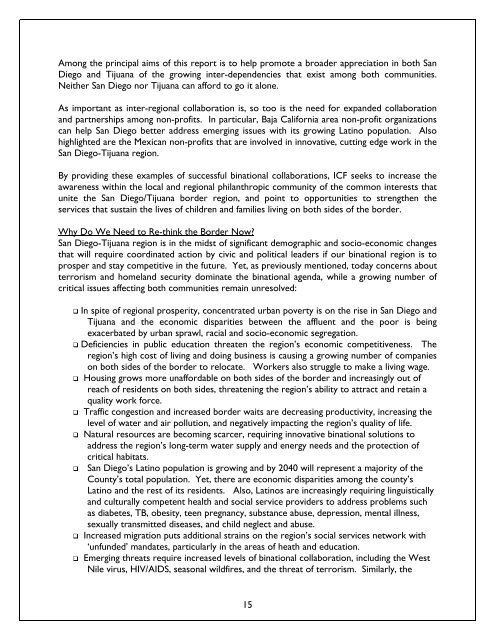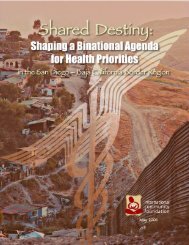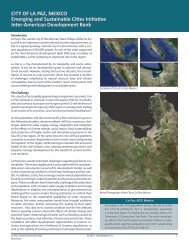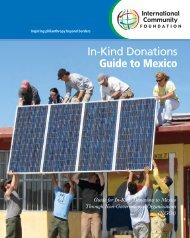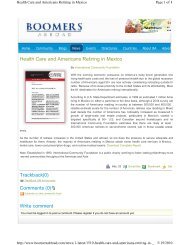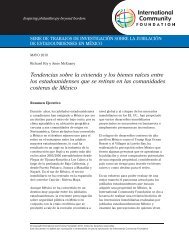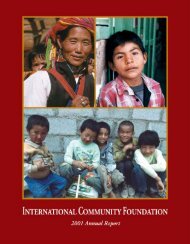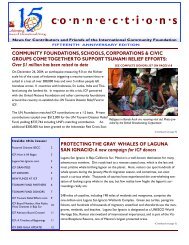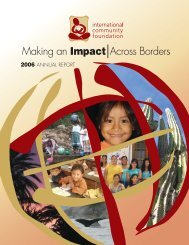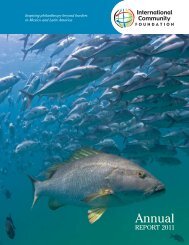Blurred Borders - International Community Foundation
Blurred Borders - International Community Foundation
Blurred Borders - International Community Foundation
Create successful ePaper yourself
Turn your PDF publications into a flip-book with our unique Google optimized e-Paper software.
Among the principal aims of this report is to help promote a broader appreciation in both San<br />
Diego and Tijuana of the growing inter-dependencies that exist among both communities.<br />
Neither San Diego nor Tijuana can afford to go it alone.<br />
As important as inter-regional collaboration is, so too is the need for expanded collaboration<br />
and partnerships among non-profits. In particular, Baja California area non-profit organizations<br />
can help San Diego better address emerging issues with its growing Latino population. Also<br />
highlighted are the Mexican non-profits that are involved in innovative, cutting edge work in the<br />
San Diego-Tijuana region.<br />
By providing these examples of successful binational collaborations, ICF seeks to increase the<br />
awareness within the local and regional philanthropic community of the common interests that<br />
unite the San Diego/Tijuana border region, and point to opportunities to strengthen the<br />
services that sustain the lives of children and families living on both sides of the border.<br />
Why Do We Need to Re-think the Border Now?<br />
San Diego-Tijuana region is in the midst of significant demographic and socio-economic changes<br />
that will require coordinated action by civic and political leaders if our binational region is to<br />
prosper and stay competitive in the future. Yet, as previously mentioned, today concerns about<br />
terrorism and homeland security dominate the binational agenda, while a growing number of<br />
critical issues affecting both communities remain unresolved:<br />
� In spite of regional prosperity, concentrated urban poverty is on the rise in San Diego and<br />
Tijuana and the economic disparities between the affluent and the poor is being<br />
exacerbated by urban sprawl, racial and socio-economic segregation.<br />
� Deficiencies in public education threaten the region’s economic competitiveness. The<br />
region’s high cost of living and doing business is causing a growing number of companies<br />
on both sides of the border to relocate. Workers also struggle to make a living wage.<br />
� Housing grows more unaffordable on both sides of the border and increasingly out of<br />
reach of residents on both sides, threatening the region’s ability to attract and retain a<br />
quality work force.<br />
� Traffic congestion and increased border waits are decreasing productivity, increasing the<br />
level of water and air pollution, and negatively impacting the region’s quality of life.<br />
� Natural resources are becoming scarcer, requiring innovative binational solutions to<br />
address the region’s long-term water supply and energy needs and the protection of<br />
critical habitats.<br />
� San Diego’s Latino population is growing and by 2040 will represent a majority of the<br />
County’s total population. Yet, there are economic disparities among the county’s<br />
Latino and the rest of its residents. Also, Latinos are increasingly requiring linguistically<br />
and culturally competent health and social service providers to address problems such<br />
as diabetes, TB, obesity, teen pregnancy, substance abuse, depression, mental illness,<br />
sexually transmitted diseases, and child neglect and abuse.<br />
� Increased migration puts additional strains on the region’s social services network with<br />
‘unfunded’ mandates, particularly in the areas of heath and education.<br />
� Emerging threats require increased levels of binational collaboration, including the West<br />
Nile virus, HIV/AIDS, seasonal wildfires, and the threat of terrorism. Similarly, the<br />
15


